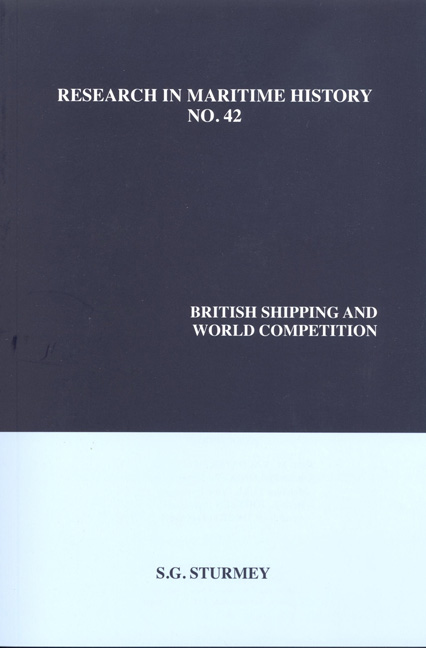Book contents
- Frontmatter
- Table of Contents
- Series Editor's Foreword
- About the Author
- Preface
- Figures and Tables
- Chapter 1 The Problem Defined
- Chapter 2 High Water: The Pre-1914 Period
- Chapter 3 War and Reconstruction
- Chapter 4 The Troubled Years: The Interwar Period
- Chapter 5 Nationalism in Shipping in the Interwar Years
- Chapter 6 The Birth of the Liberty
- Chapter 7 The Prosperous Age: The Postwar Period
- Chapter 8 Enemies of Competition in the Postwar Years
- Chapter 9 Flags of Convenience
- Chapter 10 Economics of Shipping Enterprises
- Chapter 11 Shipowning and Resource Allocation
- Chapter 12 Labour Relations and Labour Costs (by Basil Mogridge)
- Chapter 13 The Conference System
- Chapter 14 The Structure of the British Industry
- Chapter 15 The Question Answered
- Epilogue The Future
- Appendix The Contribution of British Shipping to the Balance of Payments
- Bibliography
- Index
Chapter 7 - The Prosperous Age: The Postwar Period
- Frontmatter
- Table of Contents
- Series Editor's Foreword
- About the Author
- Preface
- Figures and Tables
- Chapter 1 The Problem Defined
- Chapter 2 High Water: The Pre-1914 Period
- Chapter 3 War and Reconstruction
- Chapter 4 The Troubled Years: The Interwar Period
- Chapter 5 Nationalism in Shipping in the Interwar Years
- Chapter 6 The Birth of the Liberty
- Chapter 7 The Prosperous Age: The Postwar Period
- Chapter 8 Enemies of Competition in the Postwar Years
- Chapter 9 Flags of Convenience
- Chapter 10 Economics of Shipping Enterprises
- Chapter 11 Shipowning and Resource Allocation
- Chapter 12 Labour Relations and Labour Costs (by Basil Mogridge)
- Chapter 13 The Conference System
- Chapter 14 The Structure of the British Industry
- Chapter 15 The Question Answered
- Epilogue The Future
- Appendix The Contribution of British Shipping to the Balance of Payments
- Bibliography
- Index
Summary
The period from the end of the war into 1960 was generally prosperous for shipping with the Korean War and Suez crisis as highlights, followed in each case by a period of lower prosperity as a consequence of the over-building in the booms and, additionally, in the post-Suez period of a slackening in the growth of world trade. The result was that in 1958 and subsequent years profits became increasingly difficult to earn, and the problem of excess tonnage became important for the first time since before the war. By the close of 1960, when this narrative ends, the situation was one of considerable uncertainty and the need for a reappraisal of the whole world shipping position was apparent.
World Trade and Shipping
The volume of world seaborne trade passed its 1938 level in 1948 and has almost doubled since then as shown in table 7.1. Until 1957 the increase in trade was great enough to provide remunerative rates for all ships owned outside the really high-wage countries, such as America. Shipping capacity also increased, partly by a straight increase in tonnage as shown in table 7.1 and partly by an increase in speed and a reduction in “dead” time spent in port due to improvements in port facilities; these increases are not shown in the table. As a result, when dry-cargo trade turned down after 1957 and the tanker trade failed to maintain its previous growth, there was a sudden end to the abundant prosperity of earlier years. By mid-1959, the depth of the depression, nine percent of the world fleet, excluding the US Reserve Fleet, was idle.
The faster growth of the oil trade than of dry-cargo trades is apparent from the table. Between 1937 and 1957 the tonnage of oil moving in international seaborne trade exactly quadrupled, while in the same period the tonnage of dry cargo carried increased by only fifty percent. It is clear that the world trading pattern since the war has been such as to provide a solid basis for expansion in shipping and to provide greater opportunities for tanker owners than for owners of dry-cargo tonnage.
- Type
- Chapter
- Information
- British Shipping and World Competition , pp. 135 - 158Publisher: Liverpool University PressPrint publication year: 2009

